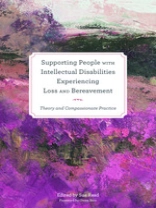Exploring contemporary theory and practice surrounding loss and bereavement for people with intellectual disabilities (ID), this book brings together international contributors with a range of academic, professional and personal experience.
This authoritative edited book looks at diverse experiences of loss across this population whether it be loss due to transition, the loss or death of others, or facing their own impending death. The book begins by offering theoretical perspectives on loss and compassion, bereavement, disenfranchised grief, spirituality, and psychological support. It then addresses contemporary practice issues in health and social care contexts and explores loss for specific communities with ID including children, individuals with autism, those in forensic environments, and those at the end of life.
Identifying inherent challenges that arise when supporting individuals with ID experiencing loss, and providing evidence and case studies to support best practice approaches, this book will be valuable reading for students, academics and professionals in the fields of disability, health and social care.
สารบัญ
Acknowledgements. Foreword by Owen Barr, Head of School of Nursing, University of Ulster, UK. Contributors. Introduction. Sue Read, Professor of Learning Disability Nursing, Keele University, UK. Part I: Theoretical Perspectives. 1. Loss in the Caring Context. Sue Read. 2. Living with Loss. Sue Read and Mary Davies, a woman with intellectual disabilities and member of Reach, UK. 3. Grief and Mourning. Sue Read. 4. Complicated Grief. Philip Dodd, Director of Psychiatry, St. Michael’s House, Clinical Senior Lecturer, Trinity College Dublin and Senior Lecturer, Centre for Disability Studies, University College Dublin, Ireland, and Noelle Blackman, CEO of Respond and Research Fellow, University Hertfordshire, UK. 5. Spirituality. William Gaventa, Director of Community and Congregational Supports, Elizabeth M. Boggs Center on Developmental Disabilities and Associate Professor, UMDNJ-Robert Wood Johnson Medical School, Georgia, US. 6. Psychological Support in Health Care. Helena Priest, Senior Lecturer, Keele University and Research Director, Doctorate in Clinical Psychology, Staffordshire University, UK. Part II: Contemporary Practice Issues. 7. Loss and Resilience. Linda Machin, Honorary Research Fellow, Keele University, UK. 8. Working Creatively to Facilitate Loss. Sue Read. 9. Caring Fatigue. Ted Bowman, Adjunct Professor, University of Minnesota (Family Education) and University of Saint Thomas (Social Work), Minnesota, US. 10. Supporting Professional Carers. Michele Wiese, Research Associate, University of Sydney, Australia. 11. Advocacy, Empowerment and Communication. Patsy Corcoran, REACH Coordinator, Asist Advocacy Services, UK. Part III: Specialist Contexts and Considerations. 12. Loss, the Family and Caring. Mike Gibbs, Lecturer in Learning Disability Nursing, Keele University, UK. 13. Loss and People with Autism. Rachel Forrester-Jones, Reader in Health, Community and Social Care, Tizard Centre, UK. 14. Loss in Forensic Environments. Ben Hobson, Clinical Psychologist, National High Secure Learning Disability Service, Rampton Hospital, UK, Sue Read and Helena Priest. 15. Supporting Children and Young People with an Intellectual Disability and Life-Limiting Conditions. Erica Brown, Senior Lecturer in Early Childhood, Institute of Education, University of Worcester, UK. 16. Loss and End of Life Care. Karen Ryan, Consultant in Palliative Medicine, St Francis Hospice and Mater Hospital and Senior Investigator, All Ireland Institute of Hospice and Palliative Care, Suzanne Guerin, Centre for Disability Studies, University College Dublin and All Ireland Institute of Hospice & Palliative Care and Phil Larkin, School of Nursing and Midwifery, University College Dublin and All Ireland Institute of Hospice & Palliative Care, Ireland. 17. Living with Shattered Dreams – A Parent’s Perspective. Mandy Parks, parent of a daughter with severe disabilities, UK. 18. Research, Inclusivity and Marginalised Groups. Sue Read. Conclusion. Sue Read. References. Index.
เกี่ยวกับผู้แต่ง
Sue Read, Ph D, is Professor of Learning Disability Nursing at Keele University, UK, and has worked in the area of intellectual disabilities since 1976. Her research interests include loss, death, dying and bereavement specifically, although not exclusively, with people with intellectual disabilities. She is also a practicing clinician supporting people with an intellectual disability and their families with issues of loss, end of life care and bereavement. She has disseminated her work widely through international conferences and publications.












